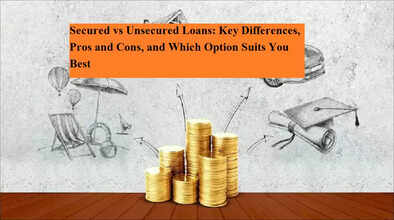Secured vs Unsecured Loans: Key Differences, Pros and Cons, and Which Option Suits You Best

Loan Guide 2025: Whether you’re applying for a home loan, car loan, or a quick personal loan, banks and NBFCs broadly categorize lending into two types—secured and unsecured loans. While both serve different financial needs, the choice you make can affect your repayment terms, interest burden, and even your credit health. Let’s break down the differences, benefits, and risks of both types to help you decide which loan is better for you.
What is a Secured Loan?
A secured loan is one where the borrower pledges an asset (collateral) such as property, gold, or a fixed deposit to the bank in exchange for funds.
-
If the borrower fails to repay, the lender has the right to sell the pledged asset to recover dues.
-
Because the bank’s risk is lower, these loans usually come with lower interest rates and longer repayment periods.
-
Common examples include home loans, car loans, and loans against property.
Secured loans are generally preferred by those who can provide collateral and want access to large amounts of money with lower EMIs spread over several years.
What is an Unsecured Loan?
In contrast, an unsecured loan does not require any collateral. Instead, banks and NBFCs assess your credit score, repayment history, and income to decide eligibility.
-
Since these loans carry higher risk for lenders, they usually come with higher interest rates and shorter repayment periods.
-
However, the big advantage is that approvals are faster, and the loan amount is credited quickly to the borrower’s account.
-
Examples include personal loans, consumer durable loans, and credit card loans.
Unsecured loans are often taken for smaller expenses such as travel, medical emergencies, or consumer purchases, where speed and convenience matter more than cost.
Which Loan is More Beneficial for Customers?
The choice depends on your financial situation and borrowing purpose:
-
Choose a secured loan if you have assets to pledge and want a lower interest rate with longer tenure. It’s ideal for buying a house, vehicle, or funding large expenses.
-
Opt for an unsecured loan if you need quick funds, don’t want to risk your property, or don’t have collateral. But keep in mind—it is more expensive in the long run.
Rising Popularity of Unsecured Loans
In recent years, especially with the rise of fintech companies, unsecured loans have become extremely popular in India. While they carry more risk for banks, lenders benefit from higher interest income. Customers also find them convenient since no collateral or guarantor is required, making the process simple and fast.
Expert Advice
-
A good credit score can help you get instant approval for unsecured loans. Many banks and NBFCs regularly send personal loan offers to customers with strong credit profiles.
-
However, experts caution against borrowing unnecessarily. Since unsecured loans are expensive, they should be taken only when there is a genuine financial need.
Final Word
Both secured and unsecured loans have their place in financial planning. Secured loans provide affordable, long-term financing if you are comfortable pledging assets, while unsecured loans offer speed and flexibility at a higher cost. The best choice depends on your repayment capacity, urgency, and financial goals.

